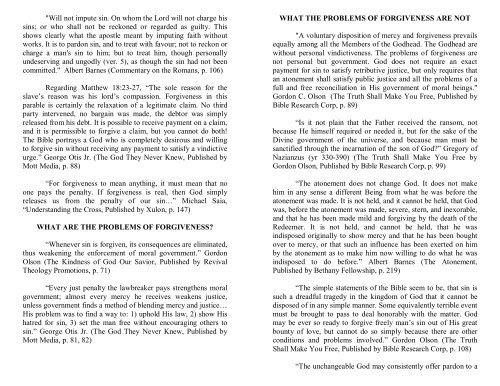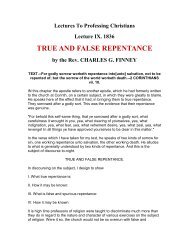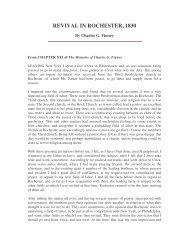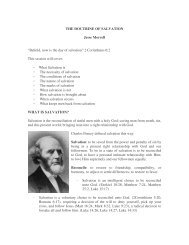Does_God_Take_Away_Free_Will_Jesse_Morrell 2.pdf - PinPoint ...
Does_God_Take_Away_Free_Will_Jesse_Morrell 2.pdf - PinPoint ...
Does_God_Take_Away_Free_Will_Jesse_Morrell 2.pdf - PinPoint ...
You also want an ePaper? Increase the reach of your titles
YUMPU automatically turns print PDFs into web optimized ePapers that Google loves.
"<strong>Will</strong> not impute sin. On whom the Lord will not charge his<br />
sins; or who shall not be reckoned or regarded as guilty. This<br />
shows clearly what the apostle meant by imputing faith without<br />
works. It is to pardon sin, and to treat with favour; not to reckon or<br />
charge a man's sin to him; but to treat him, though personally<br />
undeserving and ungodly (ver. 5), as though the sin had not been<br />
committed." Albert Barnes (Commentary on the Romans, p. 106)<br />
Regarding Matthew 18:23-27, “The sole reason for the<br />
slave’s reason was his lord’s compassion. Forgiveness in this<br />
parable is certainly the relaxation of a legitimate claim. No third<br />
party intervened, no bargain was made, the debtor was simply<br />
released from his debt. It is possible to receive payment on a claim,<br />
and it is permissible to forgive a claim, but you cannot do both!<br />
The Bible portrays a <strong>God</strong> who is completely desirous and willing<br />
to forgive sin without receiving any payment to satisfy a vindictive<br />
urge.” George Otis Jr. (The <strong>God</strong> They Never Knew, Published by<br />
Mott Media, p. 88)<br />
“For forgiveness to mean anything, it must mean that no<br />
one pays the penalty. If forgiveness is real, then <strong>God</strong> simply<br />
releases us from the penalty of our sin…” Michael Saia,<br />
“Understanding the Cross, Published by Xulon, p. 147)<br />
WHAT ARE THE PROBLEMS OF FORGIVENESS?<br />
“Whenever sin is forgiven, its consequences are eliminated,<br />
thus weakening the enforcement of moral government.” Gordon<br />
Olson (The Kindness of <strong>God</strong> Our Savior, Published by Revival<br />
Theology Promotions, p. 71)<br />
“Every just penalty the lawbreaker pays strengthens moral<br />
government; almost every mercy he receives weakens justice,<br />
unless government finds a method of blending mercy and justice…<br />
His problem was to find a way to: 1) uphold His law, 2) show His<br />
hatred for sin, 3) set the man free without encouraging others to<br />
sin.” George Otis Jr. (The <strong>God</strong> They Never Knew, Published by<br />
Mott Media, p. 81, 82)<br />
WHAT THE PROBLEMS OF FORGIVENESS ARE NOT<br />
"A voluntary disposition of mercy and forgiveness prevails<br />
equally among all the Members of the <strong>God</strong>head. The <strong>God</strong>head are<br />
without personal vindictiveness. The problems of forgiveness are<br />
not personal but government. <strong>God</strong> does not require an exact<br />
payment for sin to satisfy retributive justice, but only requires that<br />
an atonement shall satisfy public justice and all the problems of a<br />
full and free reconciliation in His government of moral beings."<br />
Gordon C. Olson (The Truth Shall Make You <strong>Free</strong>, Published by<br />
Bible Research Corp, p. 89)<br />
“Is it not plain that the Father received the ransom, not<br />
because He himself required or needed it, but for the sake of the<br />
Divine government of the universe, and because man must be<br />
sanctified through the incarnation of the son of <strong>God</strong>?” Gregory of<br />
Nazianzus (yr 330-390) (The Truth Shall Make You <strong>Free</strong> by<br />
Gordon Olson, Published by Bible Research Corp, p. 99)<br />
“The atonement does not change <strong>God</strong>. It does not make<br />
him in any sense a different Being from what he was before the<br />
atonement was made. It is not held, and it cannot be held, that <strong>God</strong><br />
was, before the atonement was made, severe, stern, and inexorable,<br />
and that he has been made mild and forgiving by the death of the<br />
Redeemer. It is not held, and cannot be held, that he was<br />
indisposed originally to show mercy and that he has been bought<br />
over to mercy, or that such an influence has been exerted on him<br />
by the atonement as to make him now willing to do what he was<br />
indisposed to do before.” Albert Barnes (The Atonement,<br />
Published by Bethany Fellowship, p. 219)<br />
“The simple statements of the Bible seem to be, that sin is<br />
such a dreadful tragedy in the kingdom of <strong>God</strong> that it cannot be<br />
disposed of in any simple manner. Some equivalently terrible event<br />
must be brought to pass to deal honorably with the matter. <strong>God</strong><br />
may be ever so ready to forgive freely man’s sin out of His great<br />
bounty of love, but cannot do so simply because there are other<br />
conditions and problems involved.” Gordon Olson (The Truth<br />
Shall Make You <strong>Free</strong>, Published by Bible Research Corp, p. 108)<br />
“The unchangeable <strong>God</strong> may consistently offer pardon to a









![[PDF] SIX DAYS OR MILLIONS OF YEARS? - Answers in Genesis](https://img.yumpu.com/34887318/1/190x245/pdf-six-days-or-millions-of-years-answers-in-genesis.jpg?quality=85)






